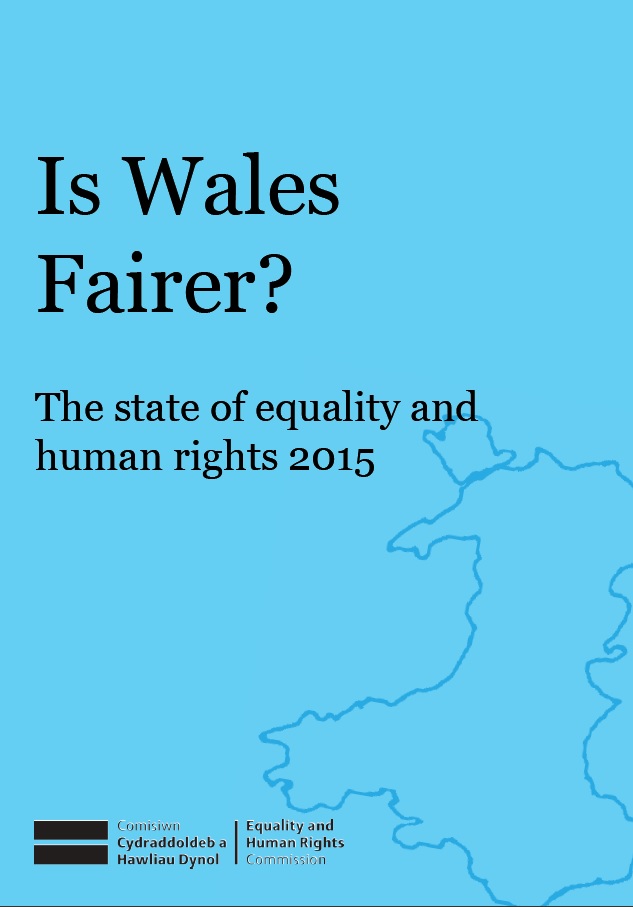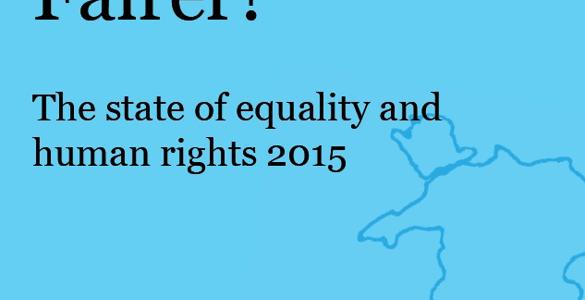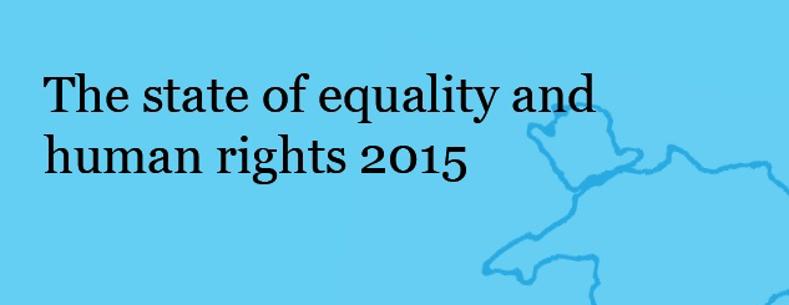Article by Hannah Johnson, National Assembly for Wales Research Service
 Yesterday (3 December) the Equality and Human Rights Commission (EHRC) published a five year progress review of equality and human rights in Wales. The report found that inequality has widened in some areas. For example, young people are significantly worse off in many ways including income, employment, poverty, housing and access to mental health services, while the suicide rate for adults, particularly men, has increased substantially. The report also found areas of improvement compared to five years ago, for example:
Yesterday (3 December) the Equality and Human Rights Commission (EHRC) published a five year progress review of equality and human rights in Wales. The report found that inequality has widened in some areas. For example, young people are significantly worse off in many ways including income, employment, poverty, housing and access to mental health services, while the suicide rate for adults, particularly men, has increased substantially. The report also found areas of improvement compared to five years ago, for example:
- pupils achieving five or more GCSEs at grades A*-C increased from 47% to 53% (including improvements for pupils with special educational needs (SEN), eligible for free school meals and pupils from ethnic monitories);
- there has been a reduction in hostility towards lesbian, gay and bisexual people, and
- there have been reductions in the exclusion rate from school amongst all ethnic groups.
The report is specific to Wales, following the publication of Is Britain Fairer? in November. Key findings for Wales are below: Employment
- unemployment among 16-24 year olds has increased so that they are now more than four times as likely to be unemployed as those aged 35-54;
- Muslims had the lowest employment rate of any group in Wales;
- less than half (42%) of disabled people were in employment in 2013 compared with nearly three-quarters (71%) of non-disabled people. The unemployment rate for disabled people rose to nearly one in eight;
- the gender pay gap narrowed from 20% to 17%., as men’s average pay declined more than women’s. Average pay in real terms fell for all age groups below age 65;
- pay gaps widened for young people, ethnic minorities and people from lower socioeconomic groups compared with some other groups. Young people were the lowest paid of all, with average earnings of £6.50 an hour compared with 35-44 year olds average pay of £11.20 an hour.
Health and care
- the suicide rate for people aged 15 and over has substantially increased between 2008 and 2013, up from 10.7 to 15.6 per 100,000 inhabitants. Male suicide has increased the most. The suicide rate has increased for certain age groups: it doubled for people aged 55 to 64; and increased by around 60% for those aged 35 to 54. It is also particularly high for middle-aged men;
- difficulties accessing Child and Adolescent Mental Health Services (CAMHS) are reported - in 2014, demand for services is said to have increased by 100% over the previous twelve months. Public spending on CAMHS has remained static over the period;
- there is evidence of continuing problems of capacity and of some children continuing to be hospitalised on adult wards;
- in 2013-14, 24% of care and nursing homes for older people did not meet the Care and Social Services Inspectorate Wales requirements.
Education
- there are some children whose attainment of five or more GCSEs at grades A*-C, remains low: Gypsy/Roma children (13%), looked-after children (17%), children with SEN (17%) and children eligible for free school meals (FSM) (26%);
- attainment gaps widened between children without SEN and those with SEN, and substantial gaps have remained between: boys and girls; pupils eligible for FSM and pupils not eligible for FSM; and ethnic minority pupils and White pupils;
- there has been some reduction in exclusions of boys compared with girls and between pupils eligible for FSM and pupils not eligible, although the gaps between the groups remain large. There have been reductions in the exclusion rate amongst all ethnic groups.
Poverty
- nearly one in four people (23%) in Wales live in poverty. Particularly high levels of poverty have persisted for children aged 0-4 (42% live in poverty), disabled people (27%), and ethnic minorities (38%);
- the profile of statutorily homeless households in Wales changed markedly between 2009-10 and 2014-15, with an increase in the number of people fleeing domestic abuse (up 19%) and people with poor mental health or learning disabilities (up 24%).
Crime
- just over three-quarters of the 1,810 hate crimes reported to Welsh police forces in 2012-13 were racially motivated, with black people being most likely to be the victim;
- 7% of adults in Wales reported experiencing discrimination, harassment or abuse in the previous 12 months. These experiences were reported by: one in five people from an ethnic minority; one in five people from a religious minority; one in ten young people; one in ten disabled people, and one in ten people who have never worked or who are long-term unemployed;
- the number of adults, children and young people that were reported to be victims of trafficking almost doubled between 2012 and 2014, up from 34 to 70 reported cases;
- the number of domestic violence incidents recorded by the police increased during the same period, as did the number of convictions (by 20%).
Democratic participation
- less than one in four people in Wales feel that they are able to influence decisions affecting their local area. Older people (aged 75 and over), disabled people and women feel less able to influence decisions than some other groups;
- there is little evidence of improvement in political representation in the last five years, with women, disabled people, young people, ethnic minorities, religious minorities and lesbian, gay, bisexual and transgender (LGBT) people remaining under-represented at all levels of politics in Wales.
Legislative context Key UK legislation, such as the Human Rights Act 1998 and the Equality Act 2010, applies in Wales. In the last five years, UK legislation has created new crimes of forced marriage, stalking, and female genital mutilation as well as allowing same-sex marriage. In Wales, human rights and equality are strengthened by the Government of Wales Act 2006, which stipulates that a provision of an Act of the Assembly is outside the Assembly’s legislative competence if it is incompatible with the European Convention on Human Rights, and that Welsh Ministers cannot act incompatibly with these rights. The Assembly introduced several key pieces of devolved legislation relating to equality and human rights in the past five years, which included:
- The Rights of Children and Young Persons (Wales) Measure 2011 provides a statutory duty for Welsh Ministers to have due regard to Part 1 of the UN Convention of the Rights of the Child.
- Children and Families (Wales) Measure 2010 provides a legal basis for the Welsh Government’s commitment to eradicate child poverty and to reform arrangements for childcare.
- Carers Strategies (Wales) Measure 2010 placed a duty on the Welsh NHS and local authorities to work together to create joint strategies for carers.
- Mental Health (Wales) Measure 2010 extended the provision of mental health advocacy and widened access to mental health services.
More recent legislation with significant equality and human rights elements includes the Social Services and Well-being (Wales) Act 2014, Education (Wales) Act 2014, Housing (Wales) Act 2014 and the Violence against Women, Domestic Abuse and Sexual Violence (Wales) Act 2015. These economic, political and legislative changes are the context in which to consider whether Wales is fairer compared with five years ago.






